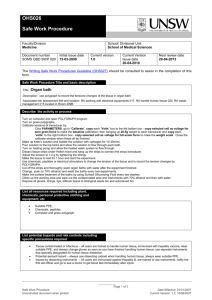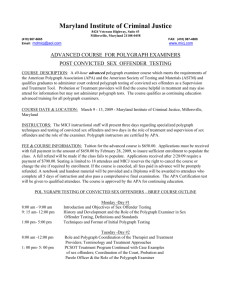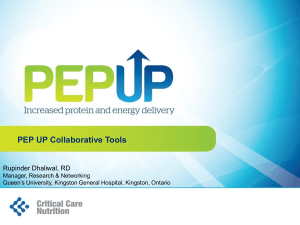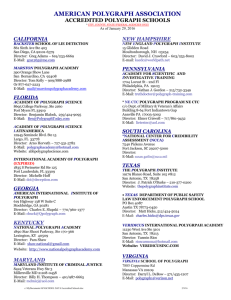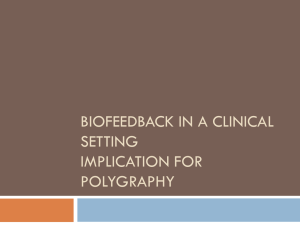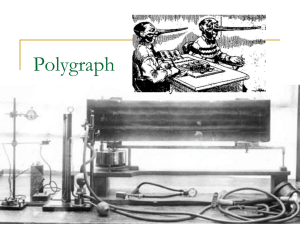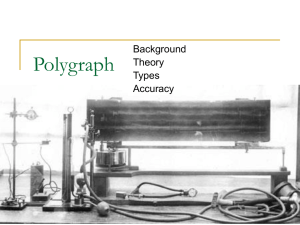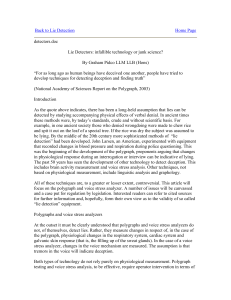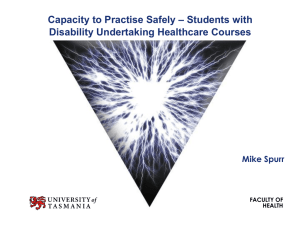POLYGRAPH
advertisement
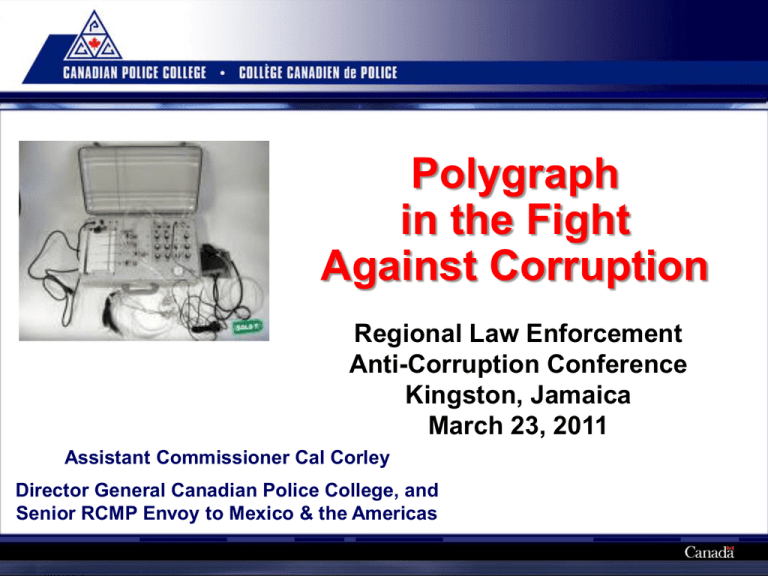
Polygraph in the Fight Against Corruption Regional Law Enforcement Anti-Corruption Conference Kingston, Jamaica March 23, 2011 Assistant Commissioner Cal Corley Director General Canadian Police College, and Senior RCMP Envoy to Mexico & the Americas As Anti-Corruption Tool • Polygraph is an effective Anti-Corruption tool if properly employed in multi-faceted manner: • With current staff • Pre-employment screening • Cases in Point: – Jamaica Constabulary Force – vetting within the ranks – RCMP: Pre-employment Polygraph Why Polygraph? • Intelligence-led organization • Polygraph a smart way to operate • Help minimize risk • Proven tool in protecting our intelligence and operational assets • Not looking for perfection • just people who reflect our organizations’ Core Values • Requires: communications strategy – (internal + external) POLYGRAPH: JCF Vetting Tool Impact Percentage Vetted • Re-enforces zero-tolerance to corruption • 100%, including immediate staff High Command • 20-25 % at random, plus key sensitive positions Supt Ranks Only sensitive position incumbents • Those not vetted but who are engaged in corrupt behaviour either: • self-select out • cease and desist Inspectors and other Ranks • higher risk of being caught • Clear message to partners and community • Increase in reporting of incidents of wrong-doing • Provides critical foundational enabling transformation PRE-EMPLOYMENT POLYGRAPH • The RCMP adopted PEP in 2005 in support of the commitment to our priorities de-stabilize organized crime combat terrorism assure Canada’s economic integrity Other Canadian Police Agencies using PEP • Vancouver • Medicine Hat • West Vancouver • Moose Jaw • Delta • Regina • Calgary • Saskatoon • Edmonton • Lethbridge • Québec City • Halifax • Cape Breton Where PEP fits - in the RCMP Recruitment Process i. Applicant Questionnaire Recruiter reviews Applicant’s answers, entire file, determines suitability to proceed. Marketing Formal Application Career Presentations & Selection (from IRL) (an information session) RCMP Police Aptitude Battery (RPAB) Regular Member Selection Interview (RMSI) Physical Abilities Requirement Evaluation (PARE) Field Investigation & Security Clearance ii. Interview & Polygraph Examination - then, File Review by Recruiting Medical Clearance Enrollment PEP Interview & Polygraph Exam • Average 4.5 hours • 3.5 hours interview, question review • No trick or surprise questions • 15 – 20 minutes actual polygraph exam • 95 questions + 4 if past military service + 16 if past police service RCMP PRINCIPLES IN PEP • Not a ‘lie detector’ • No pass or fail • Interviews performed only by trained, certified polygraph examiners • Only one of several tools in selection process • Applicants assessed on entire selection process • Instructive – NOT determinative PEP Questions Explores: • Employment history, behaviour • Driving history, record, incidents • Gambling, alcohol, drug use • Use of force, interaction with police • Technology & Internet behaviour • Unlawful sexual activity • Security, loyalty issues Criteria for Non-Suitability • Any criminal activity (3 years) • Serious provincial offences (3 years) • Unpardoned criminal convictions • Pending criminal charges • Use of illicit drugs Success Rates and Data After 5 Years: Over 12,000 PEP Interviews / Exams completed 64 % move to next stage of recruiting process 36% not recommended after PEP Safeguards • Independent 2009 study into PEP confirmed the value and ROI from use of PEP • PEP often surfaced “new admissions or disclosure of information” detrimental to employment application that would not otherwise have been available to recruiters STUDY RESULTS Previous Employment • Most common was having cheated or plagiarized, including on RCMP aptitude testing • Also included theft from employers Driving History • Hit and run motor vehicle accidents • One case involved admission of street racing leading to death and evasion of police by applicant STUDY RESULTS cont’d Gambling • New disclosures on how much they had lost, won Alcohol and Drug Use • Including admissions of impaired driving, extensive alcohol consumption • Recency and extent of drug use • Rare, but present were new admissions concerning the use of heroin, meth, crack cocaine and date-rape drugs STUDY RESULTS cont’d Use of Force • Most related to minor disputes with intimate partners or family members • One case disclosed a self-described violent racist, who was fascinated with sharp-edged weapons, had previously strangled a classmate and wanted to be a police officer so he could ‘legally’ carry a weapon. STUDY RESULTS Computers and Technology • 41% admitted to pirating software and music off of the internet • A few were involved with internet fraud, hacking and on-line threats Unlawful Sexual Activity • 14% admitted to involvement with child pornography or prostitution • Others included a variety of deviant behaviours STUDY RESULTS cont’d Involvement with Law Enforcement • Involvement in theft was most common (40%), often involving employer Current or former Police, Military officers • Use of authority for personal gain, improper search and seizure, and falsifying reports Summary • “There can be no greater risk area for security in Jamaica than is posed if personnel security within the ranks of its national police service is not assured” JCF Strategic Review report, 2009. • Polygraph is a proven and effective tool in support of a comprehensive AntiCorruption Strategy – use it! 19 QUESTIONS 20

